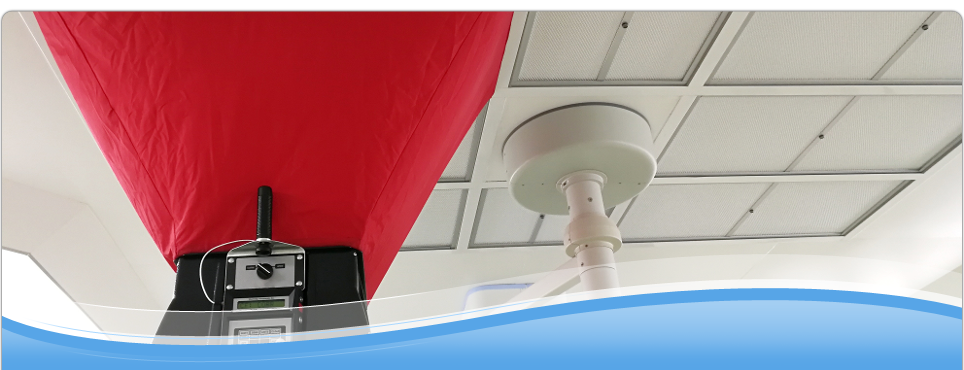Bio-Safety Cabinet Testing
Guaranteed Compliance
Whether for research or product development, it is important to uphold a clean workspace. By prioritizing the health, safety, and well-being of your personnel, your facility is able to operate more smoothly. This greatly reduces the risk of contamination of both your lab workers and the specimens they must test. Ensure the efficiency and effectiveness of your facilities with the help of our cleanroom management services. We facilitate bio-safety cabinet testing to ensure your equipment meets local, federal, and industrial guidelines.
The Importance of Bio-Safety Cabinet Maintenance
When working with pathogens and similar biological agents, it is important to conduct testing and research with adequate protection. The bio-safety cabinet (BSC) is implemented in laboratories to ensure there is a safe, isolated space for lab personnel to conduct their work. The United States Centers for Disease Control and Prevention (CDC) classifies BSCs into three classes. These classes and the types of BSCs within them are distinguished in two ways: the level of personnel and environmental protection provided, as well as the level of product protection provided.
Sterile work environments are the key to ensuring accurate lab results, effective product development--and preserving the well-being of your personnel. As such, it is always important to ensure your facilities are well-maintained and cleaned prior to, and following, laboratory procedures. By establishing a regular cleaning and maintenance schedule, your organization is able to conduct research and development at a steady, cost-effective pace. Our cleanroom facility services streamline your maintenance processes so your team can focus on their work.
Accurate Testing for Effective Operations
Our cleanroom management and maintenance company specializes in bio-safety cabinet testing in Irvine, CA. We work with you to implement a steady, routine approach to lab and facility cleanup. By adding our team to your maintenance efforts, you are able to save time and streamline your everyday operations. We make laboratory and cleanroom maintenance a cost-effective component. Routine bio-safety cabinet testing allows you to remain informed about the integrity of your testing facilities, so you know when additional maintenance, repair, or replacement procedures must be conducted.
Cabinets need to be maintained on a regular basis. All testing procedures are performed, evaluated, and presented by our well-trained and experienced personnel. As part of our testing and maintenance procedures, we carefully examine each cabinet for structural integrity, airflow efficiency, and capability to protect both product and personnel. Our team evaluates and services bio-safety cabinets of all Classes as defined by the CDC. As such, we will always tailor our procedures to match your facility’s purpose and capabilities.
General Procedures and Testing
While our services are always adjusted to meet your needs, you can also expect a generalized format to our testing. Within these checks, the air flow and filter capacities are controlled. The filters have a limited lifetime. Depending on the lab environment and the type of samples used, the filter air flow-through is reduced over time.
Newer models of cabinets measure the air flow-through constantly. If the flow-through is too low, there will be an alarm. Changing the filter should be limited to trained persons as the filter is potentially contaminated. When an ultraviolet (UV) light is used, this lamp should be checked and changed as well. UV lights decrease their power over time, resulting in suboptimal disinfection of the working area.
After determining the condition of your bio-safety cabinets, we will present our findings in a clear manner. These reports ensure you are informed of the status of your facility’s compliance with established guidelines. We can also make targeted recommendations on what actions you must take to uphold compliance. Please note that when a BSC is serviced or relocated, including replacement of HEPA filters, it must be gas decontaminated. Gas decontamination involves filling the BSC with a poisonous gas, most commonly formaldehyde gas.
The U.S. Centers for Disease Control and Prevention(CDC) www.cdc.gov classifies BSCs into three classes.[3]:6These classes and the types of BSCs within them are distinguished in two ways: the level of personnel and environmental protection provided and the level of product protection provided.
Cleanroom Facility Services specializes in bio-safety cabinet testing. Cabinets need to be maintenanced in regular pattern. Within this check, the air flow and the filter capacities are controlled. The filters have a limited life time. Depending on the lab environment and the type of samples used, the filter air flow-through is reduced over time. Recent cabinets measure the air flow-through constantly. If the flow-through is too low, there will be an alarm. Changing the filter should be limited to trained persons as the filter is potentially contaminated. When an UV light is used, this lamp should be checked and changed as well. UV lights decrease their power over time, resulting in suboptimal disinfection of the working area.
When a BSC is serviced or relocated, including replacement of HEPA filters, it must be gas decontaminated. Gas decontamination involves filling the BSC with a poisonous gas, most commonly formaldehyde gas.[3]:25
Contact us to request a consultation for bio-safety cabinet testing. Our testing and compliance evaluation services are available to clients throughout the United States.
|



